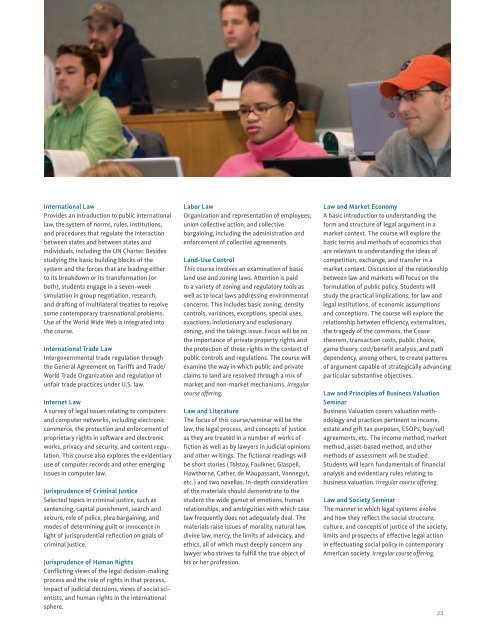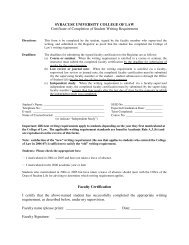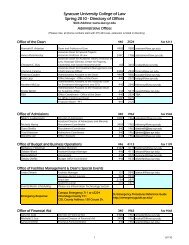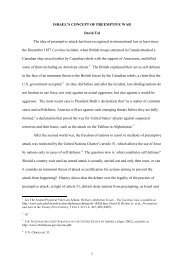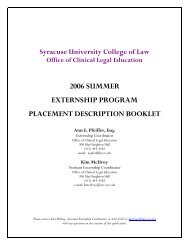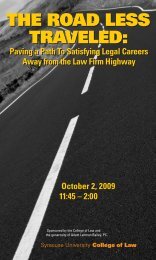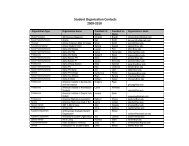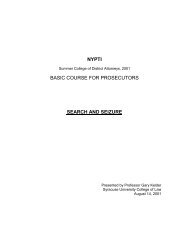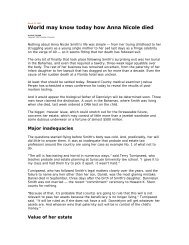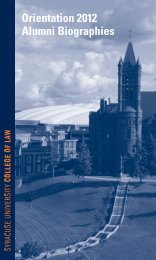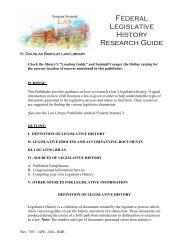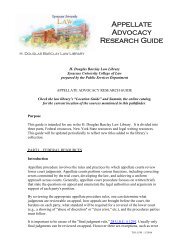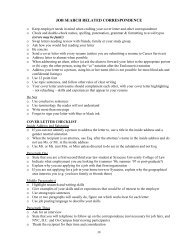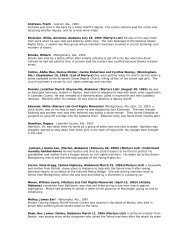CATALOG 2006-2007 - Syracuse University College of Law
CATALOG 2006-2007 - Syracuse University College of Law
CATALOG 2006-2007 - Syracuse University College of Law
Create successful ePaper yourself
Turn your PDF publications into a flip-book with our unique Google optimized e-Paper software.
International <strong>Law</strong><br />
Provides an introduction to public international<br />
law, the system <strong>of</strong> norms, rules, institutions,<br />
and procedures that regulate the interaction<br />
between states and between states and<br />
individuals, including the UN Charter. Besides<br />
studying the basic building blocks <strong>of</strong> the<br />
system and the forces that are leading either<br />
to its breakdown or its transformation (or<br />
both), students engage in a seven-week<br />
simulation in group negotiation, research,<br />
and drafting <strong>of</strong> multilateral treaties to resolve<br />
some contemporary transnational problems.<br />
Use <strong>of</strong> the World Wide Web is integrated into<br />
the course.<br />
International Trade <strong>Law</strong><br />
Intergovernmental trade regulation through<br />
the General Agreement on Tariffs and Trade/<br />
World Trade Organization and regulation <strong>of</strong><br />
unfair trade practices under U.S. law.<br />
Internet <strong>Law</strong><br />
A survey <strong>of</strong> legal issues relating to computers<br />
and computer networks, including electronic<br />
commerce, the protection and enforcement <strong>of</strong><br />
proprietary rights in s<strong>of</strong>tware and electronic<br />
works, privacy and security, and content regulation.<br />
This course also explores the evidentiary<br />
use <strong>of</strong> computer records and other emerging<br />
issues in computer law.<br />
Jurisprudence <strong>of</strong> Criminal Justice<br />
Selected topics in criminal justice, such as<br />
sentencing, capital punishment, search and<br />
seizure, role <strong>of</strong> police, plea bargaining, and<br />
modes <strong>of</strong> determining guilt or innocence in<br />
light <strong>of</strong> jurisprudential reflection on goals <strong>of</strong><br />
criminal justice.<br />
Jurisprudence <strong>of</strong> Human Rights<br />
Conflicting views <strong>of</strong> the legal decision-making<br />
process and the role <strong>of</strong> rights in that process,<br />
impact <strong>of</strong> judicial decisions, views <strong>of</strong> social scientists,<br />
and human rights in the international<br />
sphere.<br />
Labor <strong>Law</strong><br />
Organization and representation <strong>of</strong> employees;<br />
union collective action; and collective<br />
bargaining, including the administration and<br />
enforcement <strong>of</strong> collective agreements.<br />
Land-Use Control<br />
This course involves an examination <strong>of</strong> basic<br />
land use and zoning laws. Attention is paid<br />
to a variety <strong>of</strong> zoning and regulatory tools as<br />
well as to local laws addressing environmental<br />
concerns. This includes basic zoning, density<br />
controls, variances, exceptions, special uses,<br />
exactions, inclusionary and exclusionary<br />
zoning, and the takings issue. Focus will be on<br />
the importance <strong>of</strong> private property rights and<br />
the protection <strong>of</strong> those rights in the context <strong>of</strong><br />
public controls and regulations. The course will<br />
examine the way in which public and private<br />
claims to land are resolved through a mix <strong>of</strong><br />
market and non-market mechanisms. Irregular<br />
course <strong>of</strong>fering.<br />
<strong>Law</strong> and Literature<br />
The focus <strong>of</strong> this course/seminar will be the<br />
law, the legal process, and concepts <strong>of</strong> justice<br />
as they are treated in a number <strong>of</strong> works <strong>of</strong><br />
fiction as well as by lawyers in judicial opinions<br />
and other writings. The fictional readings will<br />
be short stories (Tolstoy, Faulkner, Glaspell,<br />
Hawthorne, Cather, de Maupassant, Vonnegut,<br />
etc.) and two novellas. In-depth consideration<br />
<strong>of</strong> the materials should demonstrate to the<br />
student the wide gamut <strong>of</strong> emotions, human<br />
relationships, and ambiguities with which case<br />
law frequently does not adequately deal. The<br />
materials raise issues <strong>of</strong> morality, natural law,<br />
divine law, mercy, the limits <strong>of</strong> advocacy, and<br />
ethics, all <strong>of</strong> which must deeply concern any<br />
lawyer who strives to fulfill the true object <strong>of</strong><br />
his or her pr<strong>of</strong>ession.<br />
<strong>Law</strong> and Market Economy<br />
A basic introduction to understanding the<br />
form and structure <strong>of</strong> legal argument in a<br />
market context. The course will explore the<br />
basic terms and methods <strong>of</strong> economics that<br />
are relevant to understanding the ideas <strong>of</strong><br />
competition, exchange, and transfer in a<br />
market context. Discussion <strong>of</strong> the relationship<br />
between law and markets will focus on the<br />
formulation <strong>of</strong> public policy. Students will<br />
study the practical implications, for law and<br />
legal institutions, <strong>of</strong> economic assumptions<br />
and conceptions. The course will explore the<br />
relationship between efficiency, externalities,<br />
the tragedy <strong>of</strong> the commons, the Coase<br />
theorem, transaction costs, public choice,<br />
game theory, cost/benefit analysis, and path<br />
dependency, among others, to create patterns<br />
<strong>of</strong> argument capable <strong>of</strong> strategically advancing<br />
particular substantive objectives.<br />
<strong>Law</strong> and Principles <strong>of</strong> Business Valuation<br />
Seminar<br />
Business Valuation covers valuation methodology<br />
and practices pertinent to income,<br />
estate and gift tax purposes, ESOPs, buy/sell<br />
agreements, etc. The income method, market<br />
method, asset-based method, and other<br />
methods <strong>of</strong> assessment will be studied.<br />
Students will learn fundamentals <strong>of</strong> financial<br />
analysis and evidentiary rules relating to<br />
business valuation. Irregular course <strong>of</strong>fering.<br />
<strong>Law</strong> and Society Seminar<br />
The manner in which legal systems evolve<br />
and how they reflect the social structure,<br />
culture, and concepts <strong>of</strong> justice <strong>of</strong> the society;<br />
limits and prospects <strong>of</strong> effective legal action<br />
in effectuating social policy in contemporary<br />
American society. Irregular course <strong>of</strong>fering.<br />
23


